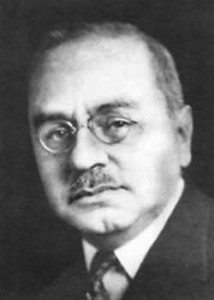
I loved the sound of the term since first hearing it. It's so forceful sounding, and just so German. Gemeinschaftsgefühl was a term used by Alfred Adler (1870-1937), an Austrian doctor and psychotherapist in the early 20th century, that is translated to English as “community feeling” or “social interest”. Other Adlerian concepts you may have heard about include the inferiority complex or the influence of birth order on personality.
To Adler, development of social interest was crucial to good health. This interest leads to successful relationships in the family, work world and the world at large. The individual successfully meets life’s challenges largely due to and through quality connection with others. Adler was one of the first to write of the strong relationship between social connections and good mental and physical health.
Adler’s theories, like many other psychological theories of the early 20th century make a lot of sense; but how do we know if they are true? In later years, scientific research began to put these ideas to the test and now it is common practice to seek evidence that our psychological ideas are valid (and don’t just sound good).
I suspected all along Adler was on to something when first learning about Gemeinschaftsgefühl. Like many of us, I thought it simple common sense quality relationships and doing good for others would relate to one’s satisfaction in life and good health, but do we know for sure? And just how important and impactful is it? Research is now bearing out the realities of deep and broad connections with others. One recent example of this evidence is a study conducted at the University of North Carolina at Chapel Hill that was published in the January 5, 2016 edition of the Proceedings of the National Academy of Sciences. Researchers used measures of three types of social relationships (social support, social integration and social strain) and studied their relationship to common risk factors for mortality (blood pressure, waist circumference, body mass index and systemic inflammation as measured by levels of C-reactive protein).
 They concluded from their results that the more social ties subjects had at an early age, the better their health was throughout the life span. By the way, earlier research has also showed longer life spans for those with more social connections. For those early and later in life, the number of social connections had the most impact. For middle age adults, quality of connections was more important than number.
They concluded from their results that the more social ties subjects had at an early age, the better their health was throughout the life span. By the way, earlier research has also showed longer life spans for those with more social connections. For those early and later in life, the number of social connections had the most impact. For middle age adults, quality of connections was more important than number.
The fact social connections have such a powerful impact is not all that surprising, but there were a couple of outcomes that did grab my attention. One finding was that for adolescents, social isolation appeared to be as damaging as physical inactivity, as it relates to inflammation. Another finding was social isolation in old age was more harmful than diabetes when it came to prevention or control of high blood pressure.
So, whether listening to these researchers, theorists like Alfred Adler or grandma’s common sense; it looks like a very necessary component of taking care of our health and well being is having a strong social interest…..or Gemeinschaftsgefühl! If this is an area that could improve for you, work on increasing the frequency and quality of interactions with your colleagues, friends and family, or call one of our counselors or peer coaches to brainstorm ideas to get connected and build Relational well-being.
Other research has looked at another type of “social interest”, that of volunteering. You can read more about the benefits of volunteering on health at: http://www.theatlantic.com/health/archive/2015/12/altruism-for-a-better-body/422280/
Here is a summary of the UNC – Chapel Hill study: https://uncnewsarchive.unc.edu/2016/01/04/social-networks-as-important-as-exercise-and-diet-across-the-span-of-our-lives/
We Can Help
Social interactions are a key component to your relational piece of your Wheel of Well Being. If you need help figuring out strategies to improve this and other aspects of your overall well-being, you can rely on VITAL WorkLife.
Call 800.383.1908 to learn more or to speak with one of our representatives or access resources through your VITAL WorkLife App. We’re available anytime, day or night.
Image credit: alfredadler.org


